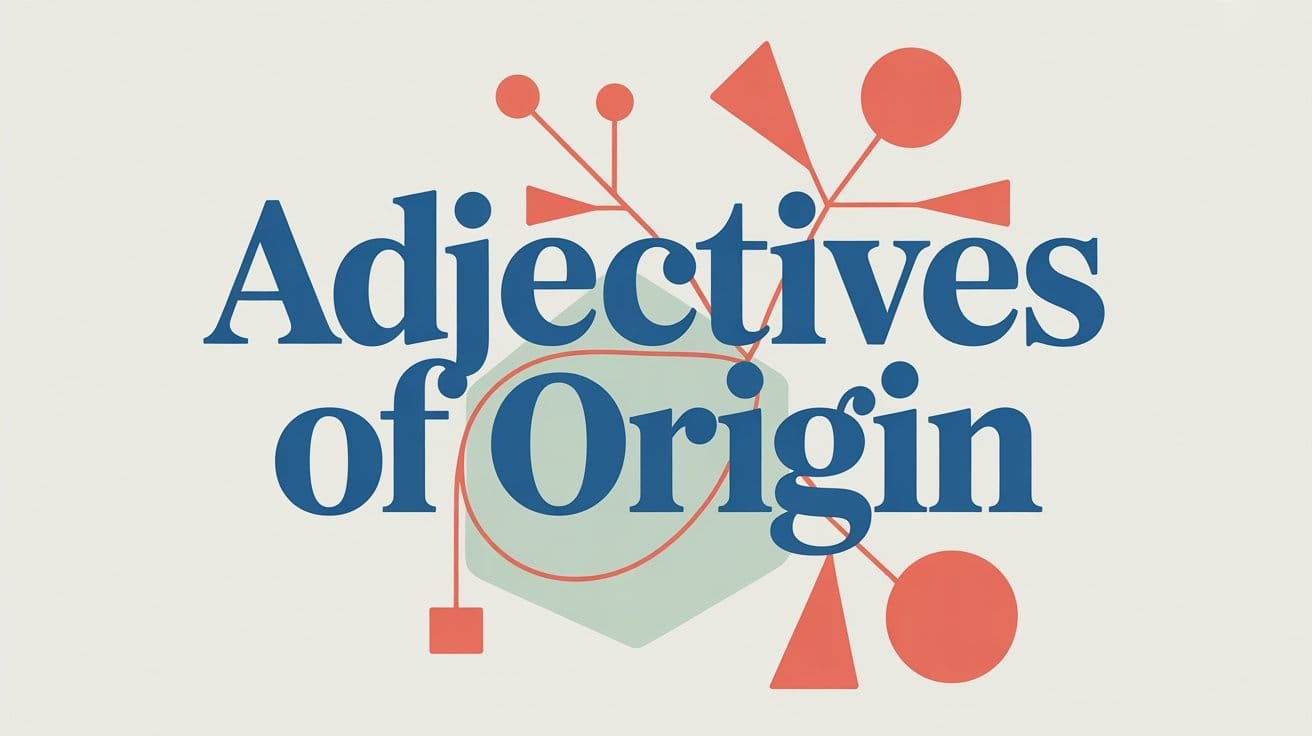Adjectives of origin describe the source, nationality, or cultural background of a person, place, object, or concept. These adjectives usually refer to a country, region, language, or ethnic group and answer the question “Where is it from?”
They are always proper adjectives and begin with a capital letter in English.
Examples:
- She collects Japanese pottery from local markets.
- They watched a French documentary about climate change.
- He loves Mexican food, especially street tacos.
Adjectives of origin are especially common in writing about geography, culture, cuisine, history, and products.
Types of Origin Adjectives: National, Regional, and Cultural
Adjectives of origin can be grouped by the type of source they describe. This helps clarify whether the adjective refers to a country, a smaller location, or a broader cultural background.
National Origin Adjectives
These refer to countries or nations and are the most common type.
Examples: American, Indian, Brazilian, Chinese, German
Example: She wore a traditional Indian saree to the event.
Regional Origin Adjectives
These describe a smaller area within a country, such as a state, province, or city.
Examples: Texan, Bavarian, Sicilian, Andalusian, Scottish
Example: He cooked a classic Sicilian pasta dish for dinner.
Cultural or Ethnic Origin Adjectives
These refer to broader groups, often including shared customs, language, or history.
Examples: Arab, Slavic, Nordic, Latin, Celtic
Example: The exhibit featured Nordic artifacts from ancient settlements.
Knowing the category helps you use these adjectives accurately, especially when discussing geography, culture, or identity.
List of 50 Adjectives of Origin in English
| American | Indian | Chinese | Brazilian | French |
| German | Italian | Mexican | Japanese | Russian |
| Korean | Spanish | Canadian | British | Australian |
| Egyptian | Greek | Turkish | Vietnamese | Thai |
| Arab | Celtic | Slavic | Nordic | Latin |
| Texan | Scottish | Irish | Welsh | Bavarian |
| Sicilian | Andalusian | Basque | Mayan | Incan |
| Persian | Mongolian | Zulu | Swahili | Nigerian |
| Filipino | Malaysian | Indonesian | Pakistani | Nepali |
| Tibetan | Afghan | Ukrainian | Polish | Dutch |
Examples of Adjectives of Origin in Sentences
She prepared a traditional Italian lasagna for the guests.
The film was a beautifully shot Japanese drama set in Kyoto.
He bought a Brazilian coffee blend that had a rich, bold flavor.
The museum had an entire wing devoted to Egyptian artifacts.
They studied Greek mythology in their literature class.
She wore a stunning Indian lehenga for the wedding.
He enjoys watching Korean dramas in his free time.
The team played a friendly match against a Mexican club.
The furniture was made from handcrafted Swahili woodwork.
They stayed in a charming Scottish cottage near the hills.
The dish combined Thai spices with local vegetables.
A French pastry chef taught the baking masterclass.
The storyteller spoke in a melodic Celtic accent.
He owns a rare collection of Persian rugs.
They explored Mayan ruins during their visit to Yucatán.
A Russian novel topped the bestseller list that month.
The dress was inspired by Andalusian dance costumes.
The restaurant offered a mix of Pakistani and Afghan dishes.
She bought a painting by a well-known Dutch artist.
Their family recipes are based on Turkish culinary traditions.
The students presented a project on Vietnamese street food culture.
He wore a colorful Nepali scarf made from yak wool.
She is studying the influence of Latin literature on modern languages.
The architecture in the village had a distinct Tibetan style.
They watched a documentary on Zulu traditions and rituals.
He ordered a spicy Filipino dish called Bicol Express.
The story follows an ancient Incan legend passed down through generations.
Their grandparents immigrated from a small Polish town.
The market had stalls selling handmade Mongolian hats.
We attended a festival celebrating Irish music and folklore.
A collection of Nordic fairy tales sat on the classroom shelf.
They toured a winery in the scenic Andalusian countryside.
The show included Malaysian dance performances and songs.
She admired the geometric patterns on a Basque textile.
He tried a traditional Nigerian stew for the first time.
Their new neighbors are of Afghan descent and very welcoming.
The fabric featured intricate Pakistani embroidery.
He’s fluent in several Slavic languages, including Bulgarian and Russian.
They learned a few phrases in the Swahili language before the trip.
The festival featured a Texan barbecue competition with live music.
FAQs About Adjectives of Origin
What is an adjective of origin?
An adjective of origin tells us where something or someone comes from. It refers to a country, region, language, or culture, such as French, Mexican, or Nordic.
Are adjectives of origin capitalized?
Yes. Because they come from proper nouns (like countries or nationalities), adjectives of origin are always capitalized in English.
Example: They served a Spanish omelet.
Can you use multiple adjectives of origin together?
It’s uncommon, but possible when comparing or blending styles.
Example: She’s half Italian and half Filipino.
How are adjectives of origin different from nationality nouns?
Nationality nouns refer to people (e.g., an Italian, a Canadian), while adjectives describe something related to the place.
Example: He is Italian (adjective). vs. He is an Italian (noun).



